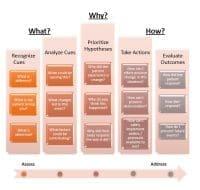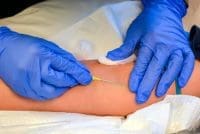The health care industry is focused on reducing costs and improving performance to maximize reimbursement. Inherent in the success of this is patient education and assumption of responsibility for their own outcomes. Health care illiteracy will affect every aspect of this issue.
Patient education is a key factor in helping patients improve their health status by learning how to prevent hospitalizations and complications from chronic diseases. Nurses are charged with providing the majority of the patient education.
Barriers to learning
To do so effectively, nurses need to understand barriers to learning. In health care, one of the most dramatic and significant barriers is health care illiteracy. This does not mean patients cannot read and write, as many will have advanced degrees and experience. Health care illiteracy can affect anyone of any age and education level.
Understanding how the health care system works is one of the first and most intimidating barriers to learning and one of the best examples of health care illiteracy. Figuring out what to ask when you don’t have a clue what you don’t know can be daunting at best, and a significant factor in determining outcomes.
Once a person leaves behind their visits to a pediatrician, unless they contract an illness or have an injury, they may see no need for health care until something thrusts them into the system many years later. Even then it may only be for flu or other short-term illness for which they may be given antibiotics and told to rest a few days and then return to their usual routine.
Learning how to follow through in the health care system
For those who encounter an acute or chronic illness, the situation can be very different. But how does the patient begin to understand the difference and learn the process of follow up care, refilling prescriptions and making lifestyle changes to prevent complications? All too often the patient is given some oral instructions and then in the interest of time, provided written literature to learn everything else.
The average adult in the U.S. reads at an 8th or 9th grade level, and most medical or health care related literature is often written at a 10th grade level or above. So already the patient is at a disadvantage. Almost half of Americans cannot read medication labels well enough to understand interactions with OTC meds. Even patients with advanced degrees can struggle to understand the process of learning to be responsible for their own health status and outcomes.
For example, a patient was given a prescription for medication he is expected to take “the rest of his life.” He “gets it” and is prepared to comply, but he panics when the bottle says, “no refills!” Doc clearly doesn’t think he’s going to live very long! YIKES!!
So this scenario can play out in many different ways.
- The patient finishes the prescription and goes about his life forgetting about the need to take this “the rest of his life.” Maybe he heard the doctor wrong, anyway he feels fine now. Until he doesn’t — and finds himself in the ER or back at the physician’s office with the same complaint. And the doctor is perplexed as to why the patient is being non-compliant.
- Or our patient continues on without the medication and his condition worsens significantly, but he doesn’t seek medical care because it only helped for a while. By the time he is forced to seek medical attention, his disease is much worse and complications have set in.
- Sometimes, the pharmacist will reiterate that this medication is for long-term use and explain that the patient needs to: a) follow up with the doctor before he runs out to see if he should continue this med or try another; or b) call the pharmacy and explains how to refill a prescription.
Don’t overlook the basics
If the patient is totally new to the healthcare system he may need very basic education in how to schedule follow up appointments and how and when to refill prescriptions. If more complex treatment is needed such as PT or out patient wound care, again basic information may be needed in order to ensure “compliance.”
Health care illiteracy is not just about reading and writing. It’s about comprehending what needs to be done in order to improve his outcomes. It can impact so many segments of the health care process, but knocking down the initial barriers can make a huge difference in how the patient fairs in the future.
Next time you encounter a patient and start to write him off as being non-compliant, peel away a few layers and figure out what he doesn’t know that he should know. He may be lacking some very basic understanding and is therefore unable to proceed or comply. Start at the beginning and give simple, concise instructions about where and how to start and then move on to the follow through.
And don’t forget to explain “No Refills” does not mean “never refill.” Advocate for your patients and learn more about how health care illiteracy can mimic non-compliance.
Kathy Quan RN BSN PHN has been a nurse for over 35 years. Her career focus has been in home health and hospice. She is also a blogger (TheNursingSiteBlog.com) and an author. The Everything New Nurse Book was her first, and Exploring the Home Health Experience; a Guide to Transitioning Your Career Path, is her 7th book. (Available at Amazon.com). Kathy maintains several websites and writes for many nursing and health care sites. Learn more at KathyQuan.com.



















1 Comment.
Dear Editor:
I recently read “Noncompliance or Healthcare Illiteracy” by Kathy Quan, in the April 13, 2016 issue of “American Nurse Today”. I very much appreciate all she had to say about careful education of parents. It is easy to assume that patients are not following instructions, when, in reality, they may not have understood the instructions. I was a little surprised to read that the average American reads at an 8th or 9th grade level. This is great information for nurses. Instructions certainly need to be targeted to the patient’s level of comprehension.
I am currently enrolled in an RN to BSN program. As I go through this program, I find myself more and more convinced that we need to give patients the information to make the best decision and then allow them to take control of their healthcare decisions. At my current job, in the ED, I see many people who do not know what medications they are taking or why they are taking them. It is just “what the doctor told me to do”. I appreciate that the author pointed out that patients need to understand when and why to see a doctor again. Many do not see a doctor unless they have a problem. When seen by healthcare, they can be educated on getting regular check-ups and why this is important; what things the doctor wants to hear about and what things they will be screening for.
Educating patients is a huge part of nursing, second, I think, to life-saving procedures. As nurses, we cannot be reminded enough to be thorough and make sure that we are understood, and to take the opportunity to advise on future healthcare.
I absolutely agree with the importance of careful education that the author pointed out and I enjoyed the article. Several points from this article will help me with my everyday discharge instructions.
Sincerely,
Lori Saunders, RN